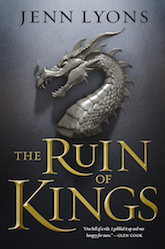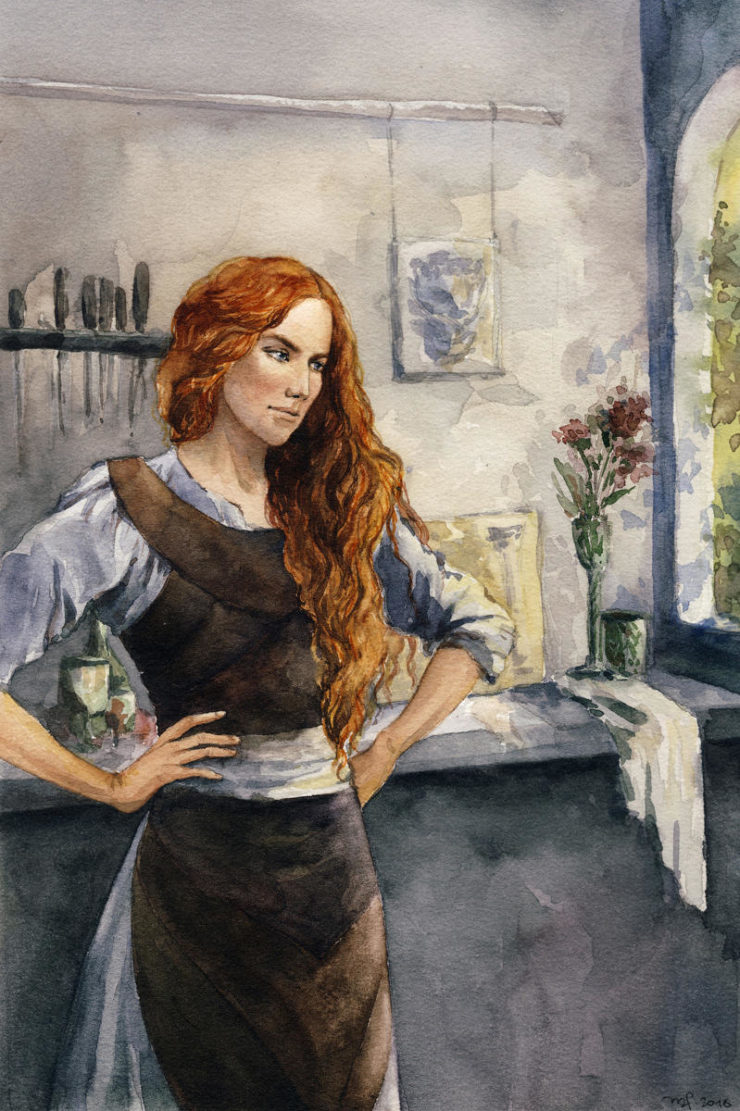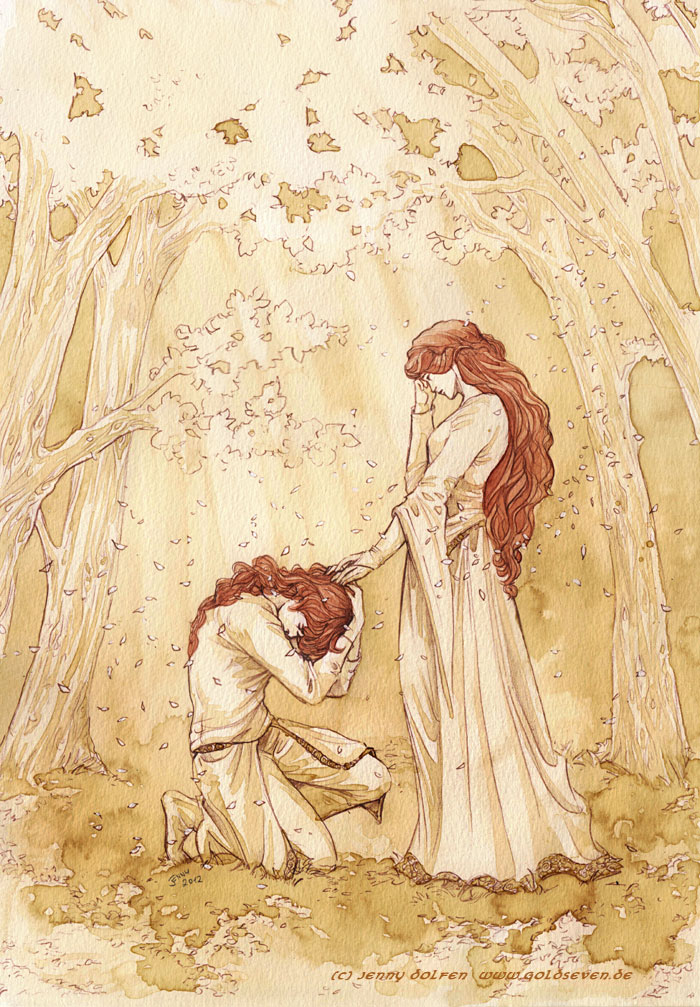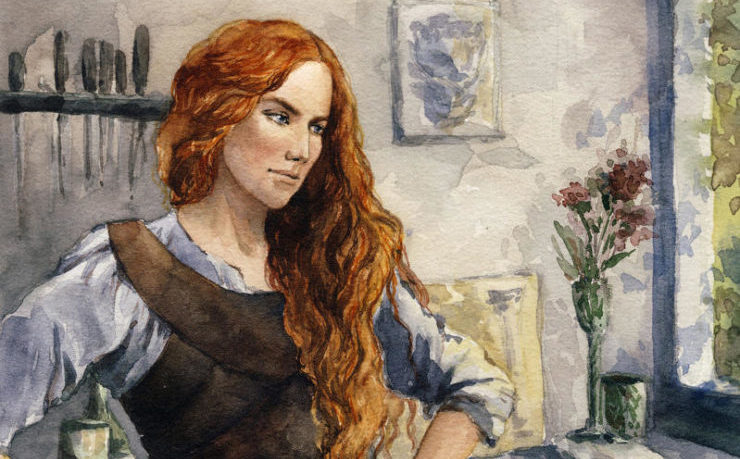In this new biweekly series, we’ll be exploring the evolution of both major and minor figures in Tolkien’s legendarium, tracing the transformations of these characters through drafts and early manuscripts through to the finished work. In this first installment, we’ll focus on Nerdanel, the Noldorin sculptor, wife of Fëanor, and mother of seven strapping sons.
In the published Silmarillion, Nerdanel exists as little more than a background figure. We’re told that she is “the daughter of a great smith named Mahtan,” and that she, like her husband Fëanor, is “firm of will.” For a while, Fëanor is content to seek her counsel, though he isolates himself in all other respects (58), but as she is “more patient than Fëanor, desiring to understand minds rather than to control them,” they soon become estranged. Fëanor’s “later deeds grieved her.” Though she gives him seven sons, and some of them apparently have her temperament, she is left out of any further mention of the family thereafter, except in one instance, when Fëanor is referred to as “the husband of Nerdanel” because the text is specifically interested in that moment with the relationship between Mahtan and Fëanor (61). Nerdanel herself is given no voice.
But who is this Nerdanel? What were her motivations and passions, and why (and how!) does she not fall under the spell of Fëanor’s compelling voice and charismatic spirit? Tolkien does not mention her in his letters, but he does give her quite a bit more attention than we’d originally suspect, if we relied only on the published Silmarillion.1
Nerdanel appears in three of the History of Middle-earth volumes: The Shaping of Middle-earth (IV), Morgoth’s Ring (X), and The Peoples of Middle-earth (XII). I’ll start here with IV and XII, leaving the best for last.
In The Shaping of Middle-earth, the only additional information we find is that some of the kinsfolk of Nerdanel are gingers: they have “rare red-brown hair” (260). Of the seven sons of Fëanor and Nerdanel, only Maedhros and the twins inherit this unusual trait, but it’s unique enough to deserve a mention, not least because this becomes one of Maedhros’s defining features. We aren’t told here whether Nerdanel herself inherited the red hair, but according to a previously unpublished bit of marginalia revealed in the journal Vinyar Tengwar (No. 41), her hair was brown and her complexion “ruddy.”
We’re given a little more information in The Peoples of Middle-earth. There we learn that there is already some tension between Fëanor and Nerdanel when the twins Amras and Amrod, the last of their children, are born. Elves are generally given two names, a “father-name,” which is usually some variation on the name of the father, and a “mother-name.” The mother-names were considered prophetic, as it was believed, and indeed rightly so, that in naming their children mothers were expressing some aspect of the child’s future. So Nerdanel cryptically gives the twins the exact same name, Ambarussa, “for they were much alike and remained so while they lived.” When Fëanor objects, “Nerdanel looked strange,” but concedes that one should be called “Umbarto,” which means “fated.” But she doesn’t say which, claiming that “time will decide” which one earns that name. Fëanor, characteristically, assumes that she meant to say “Ambarto,” or “exalted, lofty,” but rather than attempting to change his mind, Nerdanel shrugs him off with a remarkably sassy rejoinder. “Umbarto I spoke; yet do as you wish. It will make no difference” (XII 354). Shortly thereafter they become estranged, as “Fëanor became more and more fell and violent, and rebelled against the Valar.”
Tolkien included an interesting note at the heading of the manuscript dealing with the names of the Sons of Fëanor, however, that gives us some insight into just how complex family relations became in the house of Fëanor: “All the sons save Curufin preferred their mother-names and were ever afterwards remembered by them” (XII 355). The ultimate renunciation of their father-names tells us a lot about the Sons of Fëanor, but it also says something important about the relationships between Nerdanel and her sons.
Buy the Book


The Ruin of Kings
The rejection of Fëanor and his deeds that is implicit in the rejection of his name marks the brothers as more aligned with their mother than anyone might have guessed from their actions and their haste to swear the blasphemous Oath. The retention of the mother-name reinforces rather a legacy of wisdom and patience—a strong will also, it is true, but a steady thoughtfulness that is entirely absent from Fëanor’s characterization. And in the list of father-names in that same manuscript lies our answer to the apparent contradiction. Curufin, or “Kurufinwë[:] Fëanor’s own name; given to this, his favourite son, because he alone showed in some degree the same temper and talents. He also resembled Fëanor very much in face” (352, second emphasis mine). So we find that the one son who leaves behind his mother-name (which, ironically, was Atarinkë, or “little father”) bears the same name as his father and alone of all his brothers is like Fëanor in temperament. So it seems that Nerdanel gave her sons more than we might have suspected.
The Peoples of Middle-earth gives us one more scene in which Nerdanel is an actor, and it is a significant one.
[Nerdanel] retired to her father’s house; but when it became clear that Fëanor and his sons would leave Valinor for ever, she came to him before the host started on its northward march, and begged that Fëanor should leave her the two youngest, the twins, or at least one of them. He replied: “Were you a true wife, as you had been till cozened by Aulë, you would keep all of them, for you would come with us. If you desert me, you desert all of our children. For they are determined to go with their father.” Then Nerdanel was angry, and she answered: “You will not keep all of them. One at least will never set foot on Middle-earth.” “Take your evil omens to the Valar who will delight in them,” said Fëanor. “I defy them.” So they parted. (354)
This heartbreaking passage juxtaposes Nerdanel’s desperation and her foresight with Fëanor’s selfishness and rash passion. His accusation, that she is not “a true wife,” is meant to punish her, to cow her into submission, but we know from what has already passed that Nerdanel is to be trusted and respected far above Fëanor. Indeed, his attempt to manipulate her into following him by claiming she would get to keep all her sons reveals that he neither understands his wife nor comprehends a nature that doesn’t desire dominance. Behind his biting words rings a mockery of his arrogance, greed, and foolishness.
It’s even significant that he claims she was deceived by Aulë. In The Silmarillion, Aulë serves as a counterpoint to Melkor/Morgoth. Like Melkor, he desires to create on his own, and even does so; but where Melkor desires dominion over creation, Aulë offers to destroy the work of his hands rather than even appear to undermine Ilúvatar’s authority. In the texts, we’re given clues that Fëanor has the option of following the example either of Aulë (the teacher of his teacher Mahtan) or of Melkor (more on this when I write about Fëanor). He consistently chooses to follow the path of Melkor. Thus, when Fëanor attributes Nerdanel’s supposed false wife-hood to Aulë’s influence, the text is implicitly insisting that she is in the right, primarily because she does not act from an attitude of possessiveness: she desires “to understand minds rather than to control them.”

Notice, then, that her prophecy hits Fëanor precisely where it hurts: his fanatical possessiveness. He turned the conversation into a competition over their sons, but Nerdanel does not take the bait. Instead, she warns him that his attitude will lead to disaster, just as it did with the Silmarils. He doesn’t listen, of course. Nerdanel’s plea and her dark prediction hang in the air, and later we learn that this “evil omen” is one and the same with her naming of Umbarto (“fated”): the younger of the twins is, in some drafts, inadvertently burned alive by Fëanor as he slept in one of the ships at Losgar.
Where does Nerdanel get her remarkable strength and discernment? In Morgoth’s Ring we are given an introductory passage that is packed with fascinating detail from beginning to end. We learn here that Fëanor doesn’t marry her for her beauty (apparently she isn’t much to look at, at least as Elves go), but for her intelligence and talent. Nerdanel was “strong, and free of mind, and filled with the desire of knowledge.” She often journeyed alone through the hills or by the Sea, and eventually “she and Fëanor were companions in many journeys.”
Even more significant, Nerdanel was herself an accomplished sculptor and artist. In fact, she made images so lifelike that many, “if they knew not her art, would speak to them”! She was also something of an inventor: “many things she wrought also of her own thought in shapes strong and strange but beautiful.” This is especially significant because for a while, as I’ve mentioned, Fëanor is willing to learn from his wife and to seek her counsel. But gradually, we see that Nerdanel’s talent, her desire to create and her skill in the craft, is uniquely set against that of Fëanor. Where Fëanor’s great creations, the Silmarils, imprison light and beauty and in a manner that allows their glory to be locked away and hoarded, Nerdanel’s sculptures, even those of the Valar, appear to be scattered about Valinor for the free enjoyment of all. She does not hide them away. They reflect and thus increase the beauty of their surroundings rather than encasing it, denying it to others, and cutting it off from the common good—convincing us once again that she does indeed take after Aulë rather than Melkor.
After the description above, we encounter a paragraph that elaborates on the passage in the published Silmarillion. Here we learn what it means when Tolkien writes that she desired “to understand minds rather than to master them.” He explains, “When in company with others she would often sit still listening to their words, and watching their gestures and the movements of their faces. […] With her wisdom at first she restrained Fëanor when the fire of his heart burned too hot; but his later deeds grieved her” (X 272-3). Nerdanel is thus different because she is thoughtful, a listener. While Fëanor is known for his powerful voice and his ability to ensnare others with his words, Nerdanel is silent and seeks understanding. This divides them. When Nerdanel the Wise realizes that Fëanor the foolhardy will go his own way despite her counsel, she does not try to control him or force him into submission, as he does to her (remember the “were you a true wife” conversation?). Instead, she attempts to save her sons. When even this fails, because they are already spellbound by their father’s words, she returns in mourning to Valinor and lives with Indis, who also has lost her husband to Fëanor’s folly.2
I wish we knew what ultimately became of Nerdanel. We’re given a picture of a woman who knows that strength is not found in tyranny and domination, but in a quiet confidence in her own intelligence, foresight, and generosity. She is a woman who refuses to own or try to control the people and things that she loves. She isn’t a dazzling heroine like Lúthien, perhaps, and she doesn’t face the Dark Lord himself; and yet she confronts the very attitudes that corrupted Melkor in the faces of those she loves best in the world. Maybe she should have fought for them, and for her sons especially. But the fact that, through all their torments, six of her sons remembered her and her legacy and chose to identify with their mother’s example, rather than the anger and passion of their father, says a lot. Maybe she saved them after all.
This is the last we hear of Nerdanel, though, except for a heartbreaking suggestion that the youngest son, the one burned alive in the ships, was intending to sail back to his mother upon witnessing his father’s violence. I’d like to think that when the world was broken and remade, she was reunited with her sons and learned that they—all but one—chose to carry her names with them to their deaths and beyond…

But we don’t know. All we have are these brief sketches, and one final, intriguing detail to consider: Tolkien originally named Nerdanel Istarnië, a name which shares a root with Istari—“Wise Men,” or, as we know them, wizards.
Megan N. Fontenot is a hopelessly infatuated Tolkien fan and scholar, but she also studies Catholicism, eco-paganism, and ethno-nationalism in the long nineteenth century. And did she mention Tolkien?
[1]In fact, Douglas Kane has criticized Christopher Tolkien for the way his fashioning of The Silmarillion excises significant material relating to female characters.
[2]Indis was the second wife of Fëanor's father, Finwë, who was killed by Morgoth when the latter attacked Formenos to capture the Silmarils.











I’m still working my way through the archives, but I saw this and I just want to say I am so pumped for it.
I feel it would please Tolkien to imagine that her name serves as the long-forgotten root of the modern English word for someone who is highly intelligent, studious, yet uncharismatic (and whose warnings are often tragically ignored).
It took me a while to warm up to Nerdanel. On my first Silm read she was just there, in the background; not someone I had feelings about one way or another.
Then I started to pay attention to the story between the lines. Here was Feanor, flamboyantly taking up the narrative, stubborn and obsessive, drawing almost all the Noldor after him into disaster- except, there was one person he used to listen to. One person who was able to snap him, however briefly, out of his self-absorbed spiral of paranoia. One person who, when he stopped listening, called him out on on his BS and left. There was, it seemed, one Noldo with the force of personality to stand up to the Spirit of Fire.
And that was without factoring in all the stuff from HoME.
Now, Nerdanel is one of my three favorite Silmarillion characters. I cannot get enough of this amazing woman. Team Nerdanel forever!
I’m also really looking forward to this series. It’s interesting to think that Nerdanel, not just Mahtan, may have taught Feanor a thing or two about craftsmanship. Definitely adds another dimension to her character and relationship with Feanor that isn’t present in the published Silmarillion (where she seems to be more of a long-suffering wife trying to reign in her boorish husband).
I also didn’t know that about the sons’ mother-names versus father-names. Not surprising that Maedhros and Maglor chose their mother-names, since they at least weren’t horrible, but I can’t believe that Celegorm had an ounce of his mother’s temperament in him. Then again, maybe the Oath corrupted him in a different and more severe way than his older brothers.
The picture at the top reminds me of Shallan. She would also fit with Aule as an artist. Feanor would probably be a fabrial scientist who imprisons spren in his machines.
Oh wonderful, I am HERE for this series. And I love all these other details about Nerdanel I didn’t know! Clearly I need get hold of some of these other supplementary books, I have yet to read them. :D
I have every single one of these books and I’ve never put any of this together. This is a fascinating insight into the nature of sub creation in general. Creation is not a precious gem to be hidden; so, too, our sub creations most fulfil their purpose when they are revealed and shared like Nerdanel’s creations.
I enjoyed reading this very much. Thank you!
It is to Feanor’s credit that he loved Nerdanel for her independence, her talent and her character. He recognized her wisdom and paid attention to her advice. He knew she was good for him. Until his arrogance and other issues led him to disaster. Poor Nerdanel. She loved her husband and she loved her sons but she wasn’t going to follow them into error. She knew Feanor was wrong and told him so. He tried to guilt her but failed. She knew what she knew. No doubt she grieves for her family but she’s strong, she won’t let grief destroy her. She’ll go on making and creating and hope that she will somehow be reunited with husband and sons in the End.
Thanks for this very nice bit of work. I look forward to reading more.
And thank you Cybersnark! I may need to consider changing my pen-name from Tevildur to Nerd-anel!
I am pumped for this new series! Tor.com has just been cranking out quality Tolkien content for a while now, and this set of character studies looks like it’s going to continue that pattern.
I love this – I was always intrigued by the fact that Feanor was once drawn to her intelligence and will. And the fact that Nerdanel accepted him (maybe this is some biased, circular thinking) to me shows Feanor once was a decent (if fiery) guy. At least we know he didn’t *set out* to find a spouse he could dominate or just wanted as somebody who would submit to him. I always thought the story of the twins in HOME was so sad. I’m not sure if I think it’s more sad that he went with his dad in the end though.
Anyway, I love the HOME books although it’s so much information (and I read it over such a long period of time) that I don’t always remember all of it. I just noticed this is a series and I am so excited for this deep dive. I am kind of intrigued about your study of Tolkien, Catholicism and paganism (I have studied two of those in detail ;) ).
Is the part about her living with Indis in the HOME? I kind of love that of course Nerdanel would have been on good terms with her step-mother-in-law, even if Feanor was a total dick about it. And as for your first footnote, you know, I never thought about it that way. Tolkien kind of gets a bad rap, but perhaps unfairly so. Not that I don’t also respect the labor Christopher has undertaken, but it is interesting to consider that some of the decisions to truncate the female roles were his and not necessarily Tolkien’s.
I’ve always believed that once Feanor was worthy not only of Nerdanel but of the love and loyalty he gets from the other Noldor even in his madness. The death of his mother and his father’s remarriage gave him issues other Elves didn’t have to deal with but personally I believe his fiery nature was simply unsuited to the peaceful lotus eating existence of Aman.
Thank you all for your awesome responses! I’m enjoying working on this series. Nerdanel has been a personal favorite ever since I first got into the HoMe books, so she seemed like a natural place to start.
Feel free to request a character if you wish! There are so many to choose from. I’d love to hear who you’re interested in learning more about!
Ooh! Can we get an article on Andreth??
@Lisamarie
Andreth has certainly been on my mind lately… Maybe a duo-post: Andreth and Adanel, Wisewomen of Arnor? Also, I’m loving the idea that this series might develop into a critical AND appreciatory series for the oft-overlooked women of Middle-earth.
The info about Indis you requested can be found in X 179.
I have a nerd-y (yes, I did that) question for Megan and/or others about how to cite* the HoME books: I see you use Roman numerals, yet the published versions seem to be numbered with Arabic numerals. Can you comment/explain?
*Sorry folks, I’m an editor and these things haunt me.
@srEDIT: Yes, there are Arabic numerals on the covers, but Roman numerals are used in the lists found in the opening pages. In my experience, Tolkien scholars and journals use Roman numerals without exception (there could be some who/which prefer Arabic, but I’m speaking solely from my experience). It avoids confusion with the page number(s). Christopher Tolkien uses Roman numerals in citing the volumes also, which may explain how it came into accepted practice. Although, I have seem some journals/books that use alphabetic abbreviations, like MR for Morgoth’s Ring, etc. But when numbers are used, it’s generally Roman numerals.
The books of LotR are conventionally handled in a similar way, though there’s more variation here because of the numerous versions available: book, chapter, page, like so: (III, i, 10), which would refer to book 3 (NOT The Return of the King but the actual third book), the first chapter (“The Departure of Boromir”), and page 10.
I would love to see an article on Miriel Serinde/Therinde, please!
If you’re taking requests, Haleth is one of my other two favorites. Maybe compare/contrast to Beor? I love Finrod (silmcrush #3) as much as the next fangirl, but I much prefer Haleth’s snarkiness to Beor’s servility.
Thank you, Megan!
And I should have said already, how much I enjoyed reading your take on Nerdanel, and how much I am looking forward to the rest of your series!
@13: I agree. Fëanor wasn’t someone who belonged in Valinor. An eagle can’t live happily in a cottage garden. Some natures are built to strive against challenges, and if they have no real challenges or problems, they’ll end up creating them.
Ideally the Valar would have invited the Elves to Valinor, but also told them they were free to leave whenever they liked if they wanted to. The Valar’s problem (seen again with Númenor) is that above all else they want the Children to be safe and happy, sheltered from the dangers of the world. But we’re meant for more than that.
That doesn’t excuse Fëanor – he could still have expressed his discontent openly and civilly and asked leave to return to Middle-earth, if he wanted to, long before the Darkening.
The tragedy of the seven sons is that the Oath has twisted them, but they don’t even know it. Their view, generally speaking, is that all their cruelties are necessities (“the tyrant’s plea”) in the Middle-earth environment, and that they remain the sons of their mother inside, where it counts.
@22, Katherine, Exactly! The Valar want to take care of us because they value us and see protecting us as part of their job. Completely understandable and to their credit, but painfully misguided. We belong to Eru, the AllFather, not his Elder Children. We have purposes no less than the Valar and by protecting us the keep us from fulfilling our missions.